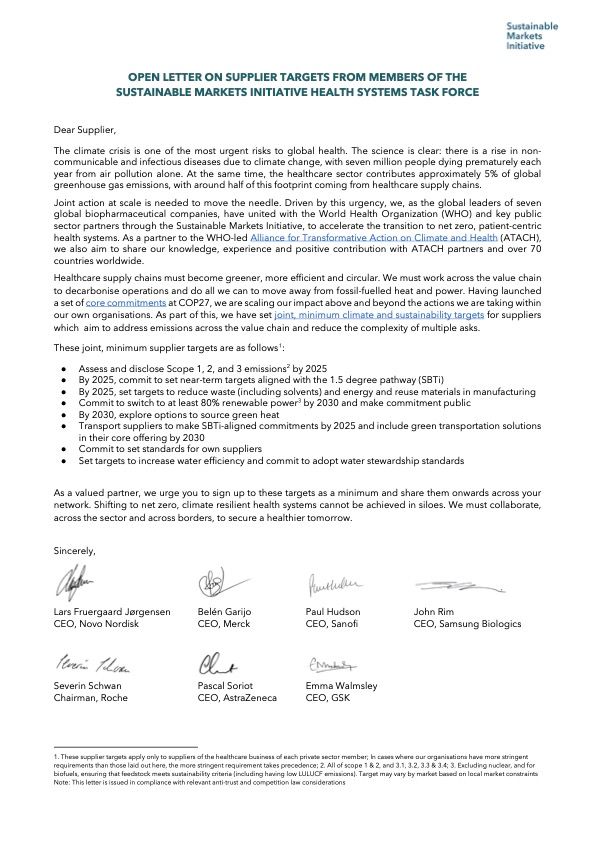Pharmaceutical Giants Collaborate to Decarbonize the Supply Chain
Pharmaceutical leaders unite for a greener future, setting joint sustainability targets to decarbonize supply chains. A monumental step towards net-zero health systems. #Sustainability #Pharma #NetZero

In the realm of sustainability, collaboration is often the key to achieving significant milestones. The pharmaceutical industry, responsible for life-saving medications and treatments, is now taking monumental steps to address its environmental footprint, particularly within its supply chain. Leading the charge is the Health Systems Task Force, a coalition of pharmaceutical giants, who have come together to set ambitious sustainability targets for their suppliers.
The Health Systems Task Force Initiative:
The Health Systems Task Force, which includes industry leaders such as AstraZeneca, GSK, Merck (known as MSD outside the US and Canada), Novo Nordisk, Sanofi, Samsung Biologics, and the Chairman of Roche, has taken a significant step by publishing an open letter to suppliers. This letter, endorsed by the CEOs and Chairpersons of these prominent pharmaceutical and health companies, emphasizes the industry's dedication to sustainability and challenges suppliers to align with these ambitious goals. The initiative, as highlighted on Sustainable Markets, underscores the collective responsibility of addressing environmental and social challenges.
Joint Minimum Climate and Sustainability Targets for Suppliers:
-
Assess and Disclose Emissions: Assess and disclose Scope 1, 2, and 3 emissions by 2025.
-
Set Near-Term Targets: By 2025, commit to set near-term targets aligned with the 1.5-degree pathway (SBTi).
-
Waste, Energy, and Materials: By 2025, set targets to reduce waste (including solvents) and energy and reuse materials in manufacturing.
-
Renewable Power Commitment: Commit to switch to at least 80% renewable power by 2030 and make the commitment public.
-
Green Heat Exploration: By 2030, explore options to source green heat.
-
Green Transportation: Transport suppliers to make SBTi-aligned commitments by 2025 and include green transportation solutions in their core offering by 2030.
-
Set Standards for Suppliers: Commit to set standards for own suppliers.
-
Water Efficiency and Stewardship: Set targets to increase water efficiency and commit to adopt water stewardship standards.

The Implications for Scope 3 Emissions:
Scope 3 emissions, which encompass all indirect emissions in a company's value chain, are a significant concern for the pharmaceutical industry. From raw material sourcing to product distribution, the complexity of the pharmaceutical supply chain presents numerous challenges in achieving sustainability targets. By collaborating and setting clear expectations for suppliers, the Health Systems Task Force aims to drive industry-wide change, pushing for innovations and practices that reduce carbon emissions across the board.
The Ripple Effect:
The collaborative effort of these pharmaceutical giants sends a powerful message to the broader industry. Suppliers, recognizing the collective demand from these industry leaders, are more likely to invest in sustainable practices, driving innovation and setting new industry standards. Moreover, as these leading companies set the pace, other pharmaceutical companies may follow suit, amplifying the impact of this initiative.
Conclusion:
The collaboration of the Health Systems Task Force represents a significant stride in the pharmaceutical industry's journey towards sustainability. By addressing the challenges within the supply chain and setting clear expectations for suppliers, these industry leaders are not only reducing their environmental footprint but also paving the way for a more sustainable future for the entire industry.
Sources:




Comments ()